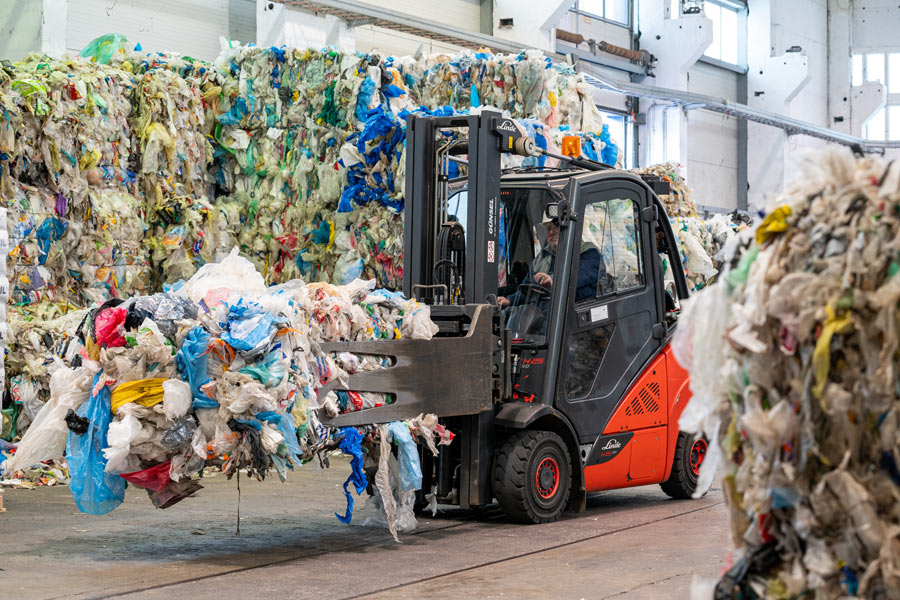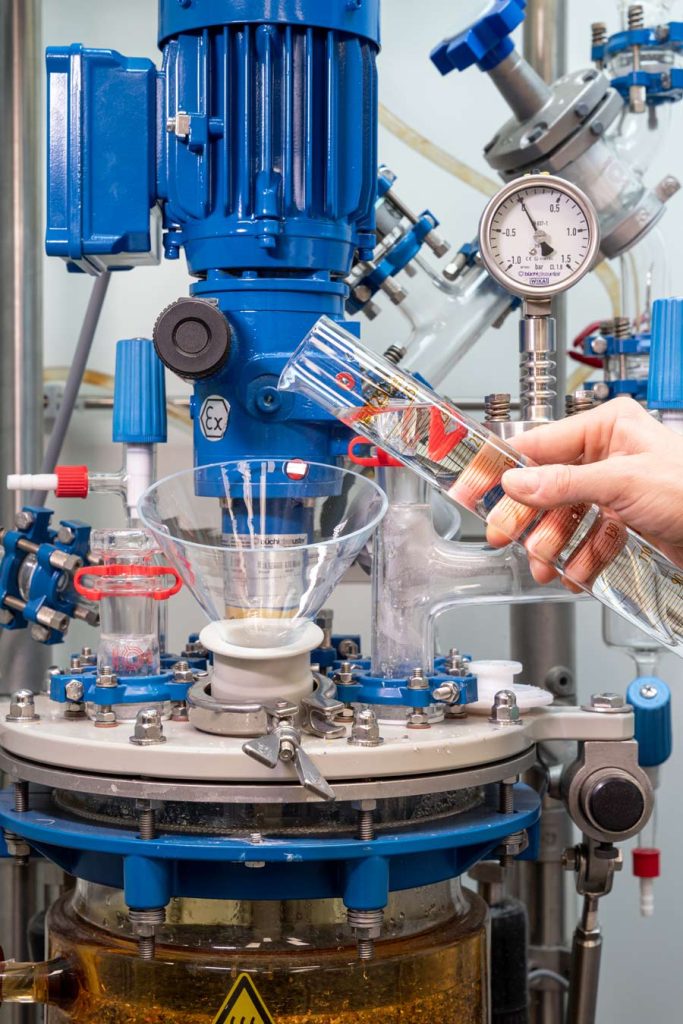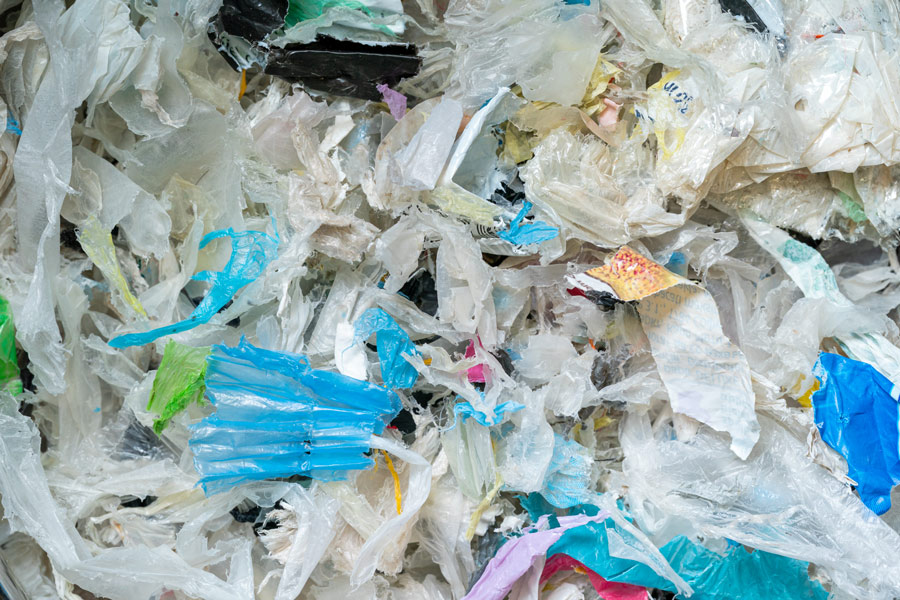Waste into starting materials: Solvent-based recycling for the polymer industry
Polymer manufacturing is an essential business, but it poses a number of challenges from an environmental perspective. Many chemical processes are energy intensive as they require high temperatures or pressure to occur. Finding ways of reusing and recycling waste into valuable components is therefore incredibly important. At APK AG in Germany, the team around Dominik Triebert and Hagen Hanel has been working on utilising these waste streams through solvent-based polymer recycling. Their innovative Newcycling® technology has the potential to turn plastic manufacturing into a more environmentally friendly circular process.
We rely on chemicals in all aspects of our life. From the fine chemicals we use in pharmaceuticals to pesticides in agriculture and commonplace plastics, chemical synthesis and production are vital to both individuals and other industries.
In the UK, the chemical industry is the second largest in the country and worth nearly 56 billion GBP. It contributes around 28 billion GBP of ‘value add’ – the value gained by transforming relatively worthless starting materials into high-value products. Across the whole of Europe, there are 565 billion Euros of sales each year. However, this economic productivity and utility come at a cost. The chemical industries are incredibly energy intensive, and many of the waste streams from chemical manufacture are complicated to deal with and potentially very hazardous to the environment. These hazards and the volume of waste that needs dealing with mean considerable expenses for chemical manufacturers. There are now focused efforts, such as the European Green Deal, that are trying to improve the sustainability of the chemical industry. Further to this, in April 2022 the UK introduced the Plastic Packaging Tax, which applies to plastic packaging components containing less than 30% recycled plastic.

All of these legislative changes and environmental concerns mean there is now a great demand for methods for recycling post-consumer waste. Currently, a huge amount of polymer waste goes to landfill or is incinerated – landfill is an unattractive option for long-lived plastic waste that can take many, many years to break down, while incineration destroys the valuable polymers and produces climate-damaging and toxic waste products. There is strong demand for ways to turn plastic rubbish into high-value plastic products that can be reused for manufacturing. However, a real problem in doing this is finding ways to create plastics that have the same material properties as newly prepared (virgin) polymers.
Despite concerns about the sustainability of plastic manufacture and the health implications of microplastics, annual plastic demand continues to increase.The only method that is currently widely employed is mechanical recycling. This can be used for the internal recycling of clean production waste if consisting of only one polymer with consistent additives and colouring. However, the predominant amount of waste is contaminated post-consumer waste streams. Plastic waste that has been treated with different colourants, for example, is difficult to recycle with this method and leads to low-quality recyclates. This is because the recycling processes can damage the underlying molecular structure of the polymer, which may cause problems with the mechanical properties of the final product.
Chemical recycling is another method which is assumed to produce virgin-like polymers by chemically breaking down the polymer structure and then building it up again via re-polymerisation. Unfortunately, this method is very energy intensive and not readily implemented as an industrial process.

One promising way of truly regenerating plastic waste with no sacrifice on the mechanical properties or appearance is solvent-based recycling. APK AG have found a way of doing just this and turning plastic waste streams into a valuable manufacturing resource.
Plastic waste recycling
APK AG were founded in 2008 and are specialists in solvent-based recycling for plastic wastes. APK AG’s particular specialism is in recycling a class of compounds called polyolefins – a family of plastics that includes some of the most commonly used polymers, like polyethylene and polypropylene, which make up food packaging, plastic bags, and many other widely used products.
The APK team has developed a process known as Newcycling® – a solvent-recycling technology that allows them to take household and municipal waste and turn it into valuable plastic granulates. They now run an industrial-scale plant in Merseburg, Germany that has been in operation since 2018 for plastic recycling of polyethylene/polyamide post-industrial multilayer films, and polyethylene-rich post-consumer film waste, including processing for decolourisation of plastics.


APK Mersalen® (left) and Mersamid® (right) granulates from the Newcycling® process.
The team have been able to find ways to regenerate the appearance of the plastic polymers in recycling without disrupting their molecular structure, which is essential for the material to have the desired final properties. This is a significant environmental goal, as despite concerns about the sustainability of plastic manufacture and the health implications of microplastics, annual plastic demand continues to increase.
Solvent-based recycling
The secret to APK AG’s success in developing their new approach to recycling plastics is in their solvent-based approach. Much like solvents are often used to clean up chemical reactions and purify products, APK AG use solvents to remove contaminants such as pigments and dyes to return the polymers to their original clean appearance. To protect their know-how, APK AG hold many patents for the decolourisation processes they use.

The plastics are initially ground up to make smaller pieces that are easier to dissolve in the solvents. Having a larger surface area relative to the plastic volume helps to speed up the dissolution process. The dissolution is then subjected to a solid–liquid-separation step to separate the remaining solids (eg, other types of plastics, labels, paper, dirt) from the solution that can be further purified. The cleaning and decontamination steps for the polymer can then be carried out in the liquid phase to the extent necessary.

The R&D-team around Triebert and Hanel has done a great deal of process optimisation for the purification and decontamination of the polymer dissolution, which now enables the production of high-quality recyclates even from highly contaminated plastic wastes. Further, their dissolution process does not result in any disruption of the molecular structure of the polymer. Other recycling methods continually shorten the polymer chain and change the final mechanical properties of the recycled material, which means there’s a limit to the number of times it can be recycled.

Solvent-based polymer recycling has many advantages over chemical or mechanical methods. It is less energy intensive and the quality of the recycled plastics is much closer to virgin polymer materials. Moreover, there are ways to reuse the solvents for the recycling process. By using distillation processes to separate solvent mixtures and ‘clean up’ the solvents after contamination, more than 99% of the solvents can be reused, avoiding the creation of another waste stream from the recycling.
The secret to APK AG’s success in recycling plastics to virgin-like recyclates is in their solvent-based approach.APK AG have been able to scale up this solvent-based polymer recycling approach to an industrial scale and are hoping to further increase the volume of polymers they can process and produce. Their workflow is an example of a circular process – where waste becomes a feedstock and is turned into a valuable product that can eventually be recycled again.
Future improvements
One of the challenges of using solvent-based recycling for a larger number of polymer species is that even chemically identical polymers in different applications may have had different treatments or were exposed to different types of contaminants. This means the decontamination process must be able to deal with all types of minerals and organics the polymer may have been exposed to during manufacture and use.

Contaminations can occur during recycling as well – these include chemicals, such as detergents, and products of polymer degradation from the polymer’s former life cycle. Degradation products need to be removed as they will affect the quality of the final recycled product. APK AG have been developing their expansion project ‘LOOP’ not just to build more recycling plants that make use of the existing Newcycling® technology, but also to apply their recycling strategies to wider ranges of polymer waste streams.
With wider uptake of energy-efficient solvent-based polymer recycling processes, it may be possible to introduce new, greener solvents to perform the extraction and cleaning processes. There are now significant research efforts looking at alternative solvents that can be produced from non-petroleum sources, are even easier to recycle and have a smaller environmental impact.
APK AG are already starting to scale up processes for new types of polymers and expand the scope of what can be recycled using their solvent-based methods. The business is paid for dealing with the waste streams that become their feedstocks and producing high-value products. With plastic use still rising, it seems these types of polymer recycling plants and processes will become an essential part of any circular economy.

Personal Response
What are the next challenges that need to be overcome for more widespread recycling of polymers in this way?Within our project LOOP, we are searching for industrial partners who are willing and able to build up new recycling plants with us all over the world, based on our newly developed technology. From the technical side, we are well prepared and equipped to scale up recycling processes on different polymer waste streams adapted to our customers’ needs, from lab to industrial scale. Therefore, we have acquired a new pilot plant/technical development center in Frankfurt, Germany (APK Newcycling Competence Center GmbH) where upscaling experiments can be performed.